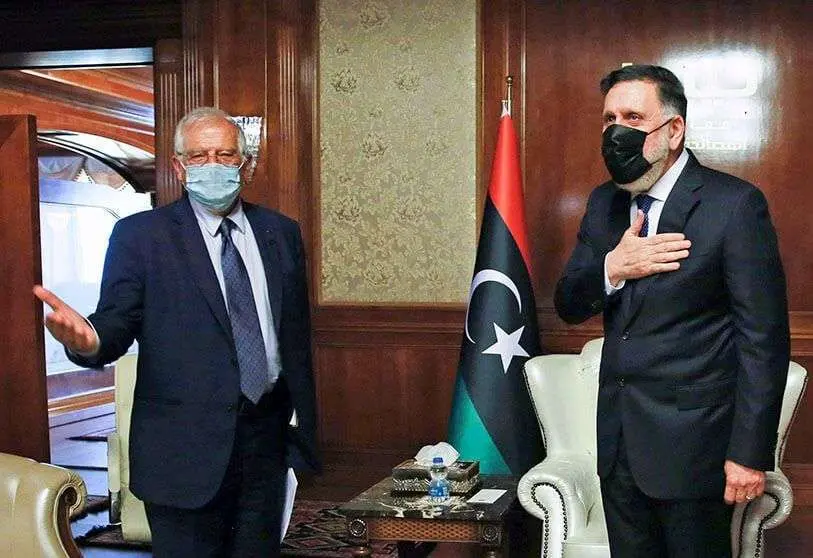Josep Borrell visits Sarraj in Tripoli to support dialogue and the lifting of the oil embargo

"Libya remains a top priority for the European Union," wrote the EU's High Representative for Foreign Policy and Security, Josep Borrell, on his personal Twitter account upon his arrival in Tripoli. This is Borrell's first visit to Libya after taking up his duties as High Representative for European Diplomacy in 2019. On his arrival in the Libyan capital, the head of European diplomacy met with the leader of the government of National Accord (GNA) - supported by the United Nations - Fayez Sarraj to analyse the civil war which has ravaged the country since 2015. Since the fall of Muammar al-Qadhafi's regime in 2011, Libya, the country with the largest oil reserves in Africa, has been the centre of successive conflicts which have exhausted the patience of the population.
The GNA, backed by the United Nations and Turkey, and the Libyan National Army, led by Marshal Khalifa Haftar, supported by Russia, Egypt, UAE, Jordan, Sudan and, to a lesser extent, France, are currently competing for power in the Mediterranean country. With this trip, the European Union hopes that the ceasefire decreed on 21 August by the Tripoli government and by the speaker of parliament, Aquila Saleh, Haftar's ally, will not be temporary and will be an effective measure for "a political solution", Borrell said.

The proposal, which was negotiated through Russia and Turkey and presented by both sides at the same time but separately, has not yet been backed by Haftar, guardian of the unrecognised executive in the East and a strongman in the country. In a statement on behalf of the 27 EU Member States the High Representative said that this was "constructive initial progress indicating the determination of Libyan officials to overcome the current stalemate and to create new hope of reaching a consensus for a peaceful political solution to the crisis and to stop any foreign interference".
Borrell insisted on the need to maintain the arms embargo that the country has been suffering from since the revolution of 2011 and which the EU military naval operation in the waters of the central Mediterranean, called "Irene", is trying to make effective. "We have discussed ways to move the political process forward, such as returning to talks in the framework of the Group + military committee and ending the oil blockade. The EU supports the Berlin process, mediation efforts and de-escalation measures, including the arms embargo, a key element in putting an end to the conflict," the Spanish politician summed up.

Turkish and Russian interests in the peace process
Furthermore, Brussels seeks to play a leading role in this process and prevent Turkey from expanding its influence in a sensitive region. The EU has expressed its anger at Turkey's participation in the Libyan powder keg.
Ankara and Moscow are also seeking its influence in the area and both are interfering with the holding of bilateral meetings in order to find a political solution. Through a statement of the Turkish Ministry of Foreign Affairs, on the two-day visit of a delegation led by the deputy foreign minister of Turkey to Russia, it announced the continuation of the meetings between Turkey and the Russian Federation "to contribute to finding a political solution in Libya". The Turkish official explained that during the talks the necessity of defining the mechanisms for the evacuation of the cities of Sirte and Jufra of the military forces was stressed in order to achieve a permanent ceasefire.

The consequences of the conflict for the country's oil sector have been devastating, as it has reduced crude oil production to less than 100,000 barrels per day compared to the 1.8 million it extracted before the revolution against Gaddafi. To this must be added the constant looting of installations. On Sunday Mustapha Sanallah, president of the Libyan National Oil Company (NOC), denounced the entry of militias similar to Marshal Haftar into the Al-Sharara oil field, the most important in the country. Borrell met with Sanallah to address this looting that occupied the plant and forced all the personnel of the multinational Akakus, which is made up of the NOC, the Norwegian oil company Equinor, the Austrian OMV and the Spanish Repsol, to leave the plant. "Dialogue is needed to ensure that oil production can be recovered, both for the benefit of the Libyans and for the prosperity of the country," said Borrell.








